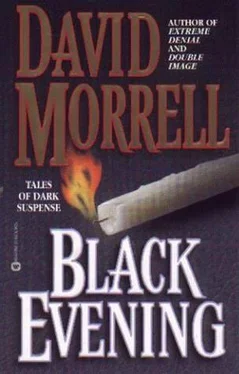David Morrell - Black Evening
Здесь есть возможность читать онлайн «David Morrell - Black Evening» весь текст электронной книги совершенно бесплатно (целиком полную версию без сокращений). В некоторых случаях можно слушать аудио, скачать через торрент в формате fb2 и присутствует краткое содержание. Жанр: Ужасы и Мистика, на английском языке. Описание произведения, (предисловие) а так же отзывы посетителей доступны на портале библиотеки ЛибКат.
- Название:Black Evening
- Автор:
- Жанр:
- Год:неизвестен
- ISBN:нет данных
- Рейтинг книги:4 / 5. Голосов: 1
-
Избранное:Добавить в избранное
- Отзывы:
-
Ваша оценка:
- 80
- 1
- 2
- 3
- 4
- 5
Black Evening: краткое содержание, описание и аннотация
Предлагаем к чтению аннотацию, описание, краткое содержание или предисловие (зависит от того, что написал сам автор книги «Black Evening»). Если вы не нашли необходимую информацию о книге — напишите в комментариях, мы постараемся отыскать её.
Black Evening — читать онлайн бесплатно полную книгу (весь текст) целиком
Ниже представлен текст книги, разбитый по страницам. Система сохранения места последней прочитанной страницы, позволяет с удобством читать онлайн бесплатно книгу «Black Evening», без необходимости каждый раз заново искать на чём Вы остановились. Поставьте закладку, и сможете в любой момент перейти на страницу, на которой закончили чтение.
Интервал:
Закладка:
"Uh, club soda," you say. "What I… Actually I want to talk to Chief Kitrick."
Overhearing, the policeman squints even harder. "Something urgent?"
"No. Not exactly." You shrug, self-conscious. "This happened many years ago. I guess it can wait a little longer."
The policeman frowns. "Then we'll finish this hand if that's okay."
"Go right ahead."
At the bar, you pay for your drink and sip it. Turning toward the wall across from you, you notice photographs, dozens of them, the images yellowed, wrinkled, and faded. But even at a distance, you know what the photographs represent, and compelled, repressing a shiver, you walk toward them.
Redwood Point. The photographs depict the resort in its prime, fifty, sixty years ago. Vintage automobiles gleam with newness on what was once a smoothly paved, busy street outside. The beach is crowded with vacationers in old-fashioned bathing suits. The impressive long pier is lined with fishermen. Boats dot the bay. Pedestrians stroll the sidewalks, glancing at shops or pointing toward the ocean. Some eat hot dogs and cotton candy. All are well-dressed, and the buildings look clean, their windows shiny. The Depression, you think. But not everyone was out of work, and here the financially advantaged sought refuge from the summer heat and the city squalor. A splendid hotel – guests holding frosted glasses or fanning themselves on the spacious porch – is unmistakably the ramshackle ruin you saw as you drove in. Another building, expansive, with peaks and gables of Victorian design, sits on a ridge above the town, presumably the charred wreckage you noticed earlier. Ghosts. You shake your head. Most of the people in these photographs have long since died, and the buildings have died as well but just haven't fallen down. What a waste, you think. What happened here? How could time have been so cruel to this place?
"It sure was pretty once," a husky voice says behind you.
You turn toward Chief Kitrick and notice he holds a glass of beer.
"After five. Off duty now," he says. "Thanks for letting me finish the game. What can I do for you? Something about years ago, you said?"
"Yes. About the time these photographs were taken."
The chief's eyes change focus. "Oh?"
"Can we find a place to talk? It's kind of personal."
Chief Kitrick gestures. "My office is just next door."
It smells musty. A cobweb dangles from a corner of the ceiling. You pass a bench in the waiting area, go through a squeaky gate, and face three desks, two of which are dusty and bare, in a spacious administration area. A phone, but no two-way radio. A file cabinet. A calendar on one wall. An office this size – obviously at one time, several policemen had worked here. You sense a vacuum, the absence of the bustle of former years. You can almost hear the echoes of decades-old conversations.
Chief Kitrick points toward a wooden chair. "Years ago?"
You sit. "Nineteen thirty-eight."
"That is years ago."
"I was born here." You hesitate. "My parents both died three weeks ago, and…"
"I lost my own dad just a year ago. You have my sympathy."
You nod, exhale, and try to order your thoughts. "When I went through my father's papers, I found… There's a possibility I may have been adopted."
As in the bar, the chief's eyes change focus.
"And then again maybe not," you continue. "But if I was adopted, I think my mother's name was Mary Duncan. I came here because… Well, I thought there might be records I could check."
"What kind of records?"
"The birth certificate my father was sent lists the time and place where I was born, and my parents' names, Simon and Esther Weinberg."
"Jewish."
You tense. "Does that matter?"
"Just making a comment. Responding to what you said."
You debate, then resume. "But the type of birth certificate parents receive is a shortened version of the one that's filed at the county courthouse."
"Which in this case is forty miles north. Cape Verde."
"I didn't know that before I came here. But I did think there'd be a hospital. It would have a detailed record about my birth."
"No hospital. Never was," the chief says.
"So I learned. But a resort as popular as Redwood Point was in the thirties would have needed some kind of medical facility."
"A clinic," the chief says. "I once heard my father mention it. But it closed back in the forties."
"Do you know what happened to its records?"
Chief Kitrick raises his shoulders. "Packed up. Shipped somewhere. Put in storage. Not here, though. I know every speck of this town, and there aren't any medical records from the old days. I don't see how those records would help."
"My file would mention who my mother was. See, I'm a lawyer, and – "
The chief frowns.
" – the standard practice with adoptions is to amend the birth certificate at the courthouse so it lists the adopting parents as the birth parents. But the original birth certificate, naming the birth parents, isn't destroyed. It's sealed in a file and put in a separate section of the records."
"Then it seems to me you ought to go to the county courthouse and look for that file," Chief Kitrick says.
"The trouble is, even with whatever influence I have as a lawyer, it would take me months of petitions to get that sealed file opened – and maybe never. But hospital records are easier. All I need is a sympathetic doctor who…" A thought makes your heart beat faster. "Would you know the names of any doctors who used to practice here? Maybe they'd know how to help me."
"Nope, hasn't been a doctor here in quite a while. When we get sick, we have to drive up the coast. I don't want to sound discouraging, Mr…"
"Weinberg."
"Yeah. Weinberg. Nineteen thirty-eight. We're talking ancient history. I suspect you're wasting your time. Who remembers that far back? If they're even still alive, that is. And God knows where the clinic's records are."
"Then I guess I'll have to do this the hard way." You stand. "The county courthouse. Thanks for your help."
"I don't think I helped at all. But Mr. Weinberg…"
"Yes?" You pause at the gate.
"Sometimes it's best to leave the past alone."
"How I wish I could."
Cape Verde turns out to be a pleasant attractive town of twenty-thousand people, its architecture predominantly Spanish: red-tiled roofs, arched doorways, and adobe-colored walls. After the blight of Redwood Point, you feel less depressed, but only until you hear a baby crying in the hotel room next to yours. After a half-sleepless night during which you phone Rebecca to assure her that you're all right but ignore her pleas for you to come home, you ask directions from the desk clerk and drive to the courthouse, which looks like a Spanish mission, arriving there shortly after nine o'clock.
The office of the county recorder is on the second floor at the rear, and the red-haired young man behind the counter doesn't think twice about your request. "Birth records? Nineteen thirty-eight? Sure." After all, those records are open to the public. You don't need to give a reason.
Ten minutes later, the clerk returns with a large dusty ledger. There isn't a desk, so you need to stand at the end of the counter. While the young man goes back to work, you flip the ledger's pages to August and study them.
The records are grouped according to districts in the county. When you get to the section for Redwood Point, you read carefully. What you're looking for is not just a record of your birth but a reference to Mary Duncan. Twenty children were born that August. For a moment that strikes you as unusual – so many for so small a community. But then you remember that in August the resort would have been at its busiest, and maybe other expecting parents had gone there to escape the summer's heat, to allow the mother a comfortable delivery, just as your own parents had, according to your uncle.
Читать дальшеИнтервал:
Закладка:
Похожие книги на «Black Evening»
Представляем Вашему вниманию похожие книги на «Black Evening» списком для выбора. Мы отобрали схожую по названию и смыслу литературу в надежде предоставить читателям больше вариантов отыскать новые, интересные, ещё непрочитанные произведения.
Обсуждение, отзывы о книге «Black Evening» и просто собственные мнения читателей. Оставьте ваши комментарии, напишите, что Вы думаете о произведении, его смысле или главных героях. Укажите что конкретно понравилось, а что нет, и почему Вы так считаете.












